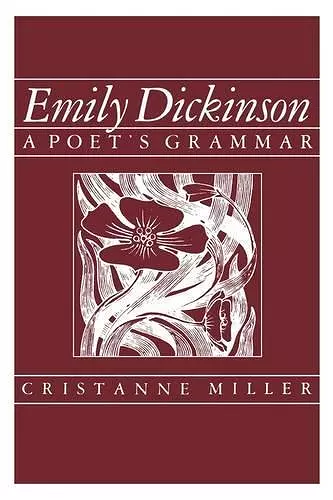Emily Dickinson
A Poet’s Grammar
Format:Paperback
Publisher:Harvard University Press
Published:14th Nov '89
Currently unavailable, and unfortunately no date known when it will be back

In this inventive work on Emily Dickinson’s poetry, Cristanne Miller traces the roots of Dickinson’s unusual, compressed, ungrammatical, and richly ambiguous style, finding them in sources as different as the New Testament and the daily patterns of women’s speech. Dickinson writes as she does both because she is steeped in the great patriarchal texts of her culture, from the Bible and hymns to Herbert’s poetry and Emerson’s prose, and because she is conscious of writing as a woman in an age and culture that assume great and serious poets are male.
Miller observes that Dickinson’s language deviates from normal construction along definable and consistent lines; consequently it lends itself to the categorical analysis of an interpretive “grammar” such as the one she has constructed in this book. In order to facilitate the reading of Dickinson’s poems and to reveal the values and assumptions behind the poet’s manipulations of language, Miller examines in this grammar how specific elements of the poet’s style tend to function in various contexts. Because many, especially modernist, poets use some of the same techniques, the grammar throws light on the poetic syntax of other writers as well.
In the course of her analysis, Miller draws not only on traditional historical and linguistic sources but also on current sociolinguistic studies of gender and speech and on feminist descriptions of women’s writing. Dickinson’s language, she concludes, could almost have been designed as a model for twentieth-century theories of what a women’s language might be. As a critical examination of the relationship between linguistic style and literary identity in America’s greatest woman poet, Emily Dickinson: A Poet’s Grammar provides a significant addition to feminist literary studies.
Cristanne Miller’s study is…densely researched and…living and contemporary in its readings of the poems. Miller works from the assumption that Dickinson sees herself ‘oppositionally, defining her position in the world negatively, by distance from some social construct or law’. And Miller shows how those negations have a constructive role. -- Tom Paulin * London Review of Books *
By returning us to fundamental issues of style, Miller focuses our attention on the relation between gender identity and literary creation… The accuracy of insight Miller brings to bear on Dickinson’s ‘cryptic revelations’ compels us to turn again to the poems to assess the revolutionary force of Dickinson’s gender-inflected, elliptic grammar of disguise. -- Joanne Feit Diehl * Tulsa Studies in Women’s Literature *
Miller is such an exciting reader… Close and thoughtful interpretation is combined with good humor throughout [the book]… [It] is readable and often delightful. Like Dickinson herself, Miller is quietly full of surprise… Cristanne Miller discovers Dickinson ‘in words (her own)’ (to use Adrienne Rich’s phrase); she sees a self-conscious, determined, decisive Emily Dickinson, not someone so stricken with grief or pain or even her own sensitivity that she doesn’t quite know what she’s doing or what she’s writing. Reminding us that Dickinson called her poems her ‘letter to the World,’ Miller views the poems as communicative, not solipsistic, acts. -- Martha Nell Smith * Women’s Review of Books *
This grammar is neither too dry nor reductive nor abstract. Rather, it provides a way to organize Miller’s insights into the particular moments and larger implications of Dickinson’s art… Miller’s understanding of Dickinson as a woman poet is especially convincing, especially compelling… A fine book: satisfying and stimulating. -- Suzanne Juhasz * Legacy *
Emily Dickinson: A Poet’s Grammar will be especially welcome… Miller’s study ultimately shows the linguistic canniness and aesthetic consciousness with which Emily Dickinson consistently distilled ‘amazing sense/From ordinary Meanings.’ -- Sandra M. Gilbert * American Literary Realism *
Miller shows readers what is actually at stake in this idiosyncratic verse and maps better than anyone to date the links between the grammatical choices and literary identity. -- David Porter * Nineteenth-Century Literature *
Reading this book makes one realize just how clumsy our approach to Dickinson’s poetry has always been. Rather than casting about for specific referents for Dickinson’s highly ambiguous references, Miller provides a method for understanding and appreciating the extraordinary suggestiveness of Dickinson’s work… This text should revise our approach to Dickinson, laying the groundwork for the meticulous examination of fundamental language use that her poems demand. * Choice *
ISBN: 9780674250369
Dimensions: unknown
Weight: 299g
212 pages